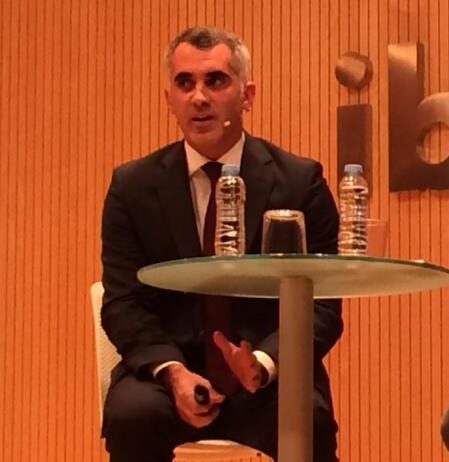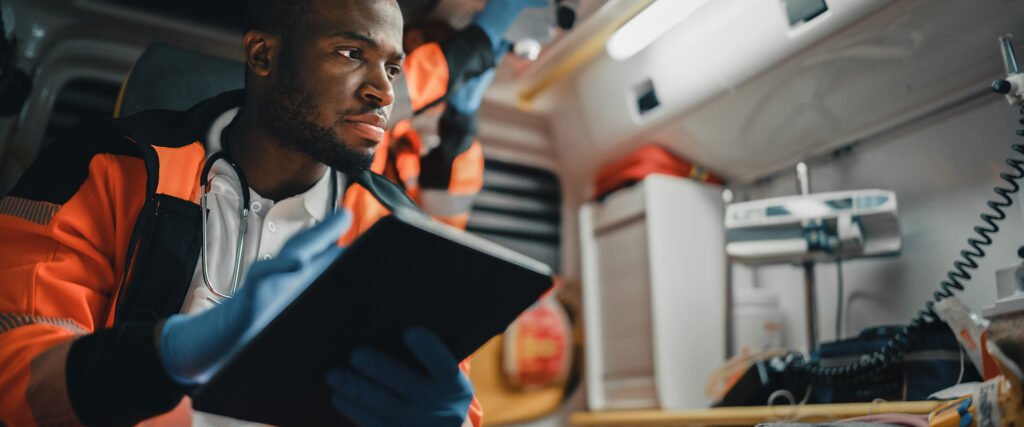Over the next 12 months, Omda will collaborate with the Valencia Emergency Medical Service (EMS) and experts at the Technical University of Valencia to develop and deploy an AI-based system that assists in accurately categorising and prioritising incoming emergency calls.
The project represents further growth in the Valencia region, which is home to around 5,000,000 inhabitants. The Omda CoordCom system has helped transform the emergency response sector by enabling Valencia 112 to manage and coordinate the communication of the incidents to approximately 120 regional emergency organisations, who then manage their specific cases.
In this instance, the largest of those 120 organisations, Valencia EMS, will be utilising the new AI solution. Valencia EMS provides emergency healthcare assistance across the region and is responsible for handling and dispatching ambulances, managing approximately 70% of the region’s 112 emergency calls. The AI-based solution aims to enhance the accuracy of call categorisation, facilitating more efficient allocation of emergency resources and ultimately improving patient safety.

AI-assisted emergency prioritisation
Valencia EMS operates around 150 ambulances, 50 of which are advanced vehicles with doctors onboard. This is one of the most significant distinctions between emergency medical response in Valencia and other regions in Europe. The divide between Valencia EMS’s standard and advanced assets is considerable, so optimal resource allocation is essential.
When cases are over-prioritised (categorised as more urgent than they are), valuable and scarce ambulance resources are directed to incidents that do not require them. When under-prioritised, patient safety is at risk. As such, accurate categorisation is both a resource optimisation and patient safety concern.
With this in mind, Valencia EMS wanted to develop a solution that utilised AI to reduce miscategorisations. The Omda CoordCom platform will augment human decision-making by providing AI guidance on how cases should be prioritised and flagging those cases it believes have been misprioritised. It will do so by assessing three core outcomes:
- Whether the situation is life-threatening
- The acceptable response delay
- If the incident falls within Valencia EMS jurisdiction.
The solution is designed to support medical coordinators at the Dispatch Control Centres in their role and has an entirely advisory function. Once implemented, it will have no decision-making capacity. Instead, it will provide medical coordinators with a percentage-based appraisal of the above three factors based on historical case data. This will help inform, but not determine, medical coordinators’ responses.
Exploring the origins of the project
Before 2013, Valencia EMS was responsible for medical emergency call-taking and dispatch. However, with the implementation of the centralised Valencia 112 system, the call-taking role was transitioned to the 112 contact centre. One of the consequences of this process is that the call-takers who respond to emergencies are not medical specialists. Instead, they handle emergency calls of all types. This can contribute to over-prioritisation of emergency medical calls.
As well as being a suboptimal use of resources, over-prioritisation impacts medical professionals’ morale and working culture. Antonio Félix de Castro, a doctor and the coordinator of the project at Valencia EMS, described how miscategorisations affected performance. “The advanced ambulance crews recognised they were attending more minor incidents and grew frustrated.”
Valencia EMS was also concerned about similar repercussions in the general population. “If you normalise the dispatch of advanced ambulances with doctors on board to minor incidents, people begin to think the system is not functioning properly when they do not receive that level of care. And that level of care is neither realistic nor appropriate.”
Recognising that it had access to vast amounts of pre-2013 call data and that AI may be able to leverage that data to improve the situation, Valencia EMS began exploring the possibility of creating a categorisation solution. To do so, it partnered with the Biomedical Data Science Lab (BDSLab) led by Prof. Juan M Garcia-Gomez at the Technical University of Valencia. In 2018, the team’s initial algorithm demonstrated that AI-based categorisation was possible and could prioritise incidents more accurately than human call-takers (for further information: https://doi.org/10.1016/j.artmed.2021.102088).

Collaborating with world-leading AI experts
The current project is a collaborative effort between Omda, Valencia EMS and BDSLab. While Valencia EMS originally identified the potential for such a solution and is providing the data set and operational insight, Omda is developing the user interface and handling integration with the wider Omda CoordCom system.
Finally, BDSLab is focused on developing the AI engineering solution. BDSLab is equipped with considerable experience in the field of medical data analysis and has been involved in numerous influential studies for medicine and pharmacy. From patenting AI-based systems to predicting survival rates in brain tumours and how patients will respond to treatments, to facilitating the early detection of postpartum depression to improve care, BDSLab has conducted cutting-edge research and is at the forefront of its field.
In all its work, BDSLab emphasises the importance of data quality. It recognises that without large volumes of high-quality data, AI projects are not effective. In one sense, this is why the collaboration has proven so fruitful.
The project is an excellent example of the way public-private partnerships are driving innovation. It also highlights Omda’s commitment to partnering with individuals and organisations operating at the cutting edge of their respective fields. While BDSLab has one of the most influential biomedical data teams in the field, Antonio Felix at Valencia EMS is pioneering a new approach to emergency call categorisation and will focus his PhD thesis on how organisations can measure the performance of projects like Valencia EMS’s AI initiative. Omda’s determination to collaborate with specialists at the forefront of developments, such as academics and experienced industry experts, sets it apart.

The benefits of a comprehensive medical dataset
The Omda CoordCom system provides the Valencia 112 emergency response organisation with operational oversight of a wide range of emergency agencies. In doing so, it has accumulated a substantial and valuable emergency response database.
This has enabled Omda and BSDLab to combine Valencia EMS’s historical data with data from hospitals and other sources. The result is millions of detailed historical medical cases and an ideal dataset to train AI models.
This amount of high-quality data is not usually available or easily accessible. In large part, the project’s viability reflects the benefits of Omda CoordCom’s approach to data-driven emergency resource management. It includes clinical, circumstantial and demographic information from EMS in-ambulance solutions and hospitals.
Juan M García-Gómez, Head of BDSLab, noted that this high-quality data was central to project success. “The availability of large volumes of multimodal data (demographics, environmental and clinical, free-text dispatcher observations and posterior physician diagnosis, manoeuvres and procedures) is essential in a project like this. It is one of the reasons why the Omda and BDSLab collaboration has been so productive up to this point”.
Crucially, the solution can also analyse free text. Historically, this was difficult to leverage. However, with the advent of Large Language Models and access to a large data set, it is now possible to analyse free text and extract critical insights. It is particularly valuable in the context of emergency service provision and ambulances, as free text dispatcher observations contribute to a fuller understanding of the incident context by the AI module.
Next steps in the project
Though the project is in the early stages of development, initial results indicate improved categorisation accuracy across all three decision-making areas (life-threatening, response delay and jurisdiction). Development will occur over the next 12 months and be broken down into stages.
Valencia EMS recognises implementation is just as important as development and a comprehensive strategy has been drawn up. As such, medical coordinators will receive training to ensure they know how the solution works, how it supports decision making and that it acts in an advisory capacity. Feedback from medical professionals will also ensure continued accuracy.
Looking ahead, the project shows significant potential for further development. One of the most interesting early takeaways is that Large Language Models and analysing what call operators write about each case is one of the most valuable data points in the categorisation process and drastically improves accuracy. With this in mind, Omda CoordCom’s new speech-to-text capabilities are one avenue to explore in the future. They will make the entire operator-caller conversation accessible for analysis and may unlock features such as AI-assisted operator prompting and real-time, ongoing classifications that update as information is provided during the call.
Looking to the future
The Valencia EMS AI project is a fascinating project that demonstrates Omda’s commitment to innovation. The ability to facilitate solutions that meet the evolving needs of long-standing Omda partners, such as Valencia EMS, is central to maintaining those relationships and continuing to deliver value to customers.
Åsa Sellhed, Omda CoordCom Feature Responsible, believes the project is a fantastic example of Omda’s ability to continue delivering value to customers. “The AI dispatch assist project will optimise resource use for Valencia EMS, enabling it to do more with less and maximising the value of its response assets. That it is made possible by Omda CoordCom data also shows that we design solutions that empower customers to reach further and do more”.
While the foreseeable future will be dedicated to developing the solution in Valencia, there is no reason it cannot be adapted for other regions in the long term. With the EENA Conference due to be held in Valencia next year, the team looks forward to showing how AI technology can empower emergency service providers to make better use of their data, improve operational efficiency and deliver high-quality care for patients.